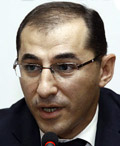Vartan Oskanyan’s comments on his facebook wall seem to be the continuation of the former prime-minister Hrant Bagratyan’s letters and critics concerning the economic policy in Armenia.
Yesterday the finance deputy minister Vartan Aramyan answered to the comments of the former foreign affairs minister. He is the same person who usually answers to the comments and observations of former PM Hrant Bagratyan. It is not excluded that the digital debate will continue in this case as well. The deputy minister said several ideas, which have caught our attention. The most interesting comment concerns foreign exchange rates fluctuations. Concerning the foreign currency risks Oskanyan wrote the following comment on his facebook wall: “Day by day the Armenian national currency is slumping, while the foreign debt is growing.” The government’s official strategy writes about managing the foreign currency risks: “There are foreign currency risks too because most of the foreign debts are in foreign currencies, even though the answers of stress-tests show that we will not have problems with covering the foreign debt up to 20% inflation of the national currency.” It seems that 20% inflation is far away, but in consideration of the recent experience when there was rapid inflation in a short period of time, it is quite realistic risk.
The mentioned official statement may also show the level of impact of foreign currency fluctuations on foreign debt. For example, finance ministry’s report on foreign debt posted in their web site writes the following: “In the end of 2011 the foreign debt of Armenia compared to 2010 increased by 177.5 billion drams, 80.0 billion out of which was resulted from the national currency inflation over the US dollar.”
In answer to Oskanyan’s observation on the above mentioned, Aramyan said, “It’s correct that inflation even increased the load of foreign debt in foreign currency, but if we understand that the budget is a chart of flows, we will see that in the same manner of the foreign currency change influences on outflows in foreign currency, it will also influence on the inflow in foreign currency. Accordingly the only fact that we are simply attracting foreign currency (foreign currency inflows are more than outflows), shows that the situation is totally different. Second, inflation has indirect impact on the budget also due to tax increase from imports because the customs fees of products or the tax base of payments increases as a result of that. Third, inflation has also another indirect impact on the budget, but this time from the long-term prospective as it results in export growth, which in its turn fosters economic growth and results in more budget inflow. Mr. Oskanyan usually describes the situation as he wants to see it, as a result of which the real picture is marred.”
In the second part of the response, the deputy minister explains that being importing country gives more budget inflow as taxes grow as well. However, the first part is more interesting. We are a country that attracts foreign currency. This means that from the prospective of covering foreign debt we rely not on domestic resources but ones coming from outside. In other words, we borrow money to pay for borrowings. This is a budget message too. “During 2012 we expect to receive 505 million US dollars for the purposes of the RA foreign debts, including 301 million for the purposes of the government’s obligations. During 2012 it is planned to cover 265.3 million of foreign debt.” This budget note shows that the government is planning to cover a large part of the foreign debt on the account of money inflow from outside. It is also very interesting to look at the deputy minister’s answer to the observation that most of the recruited amounts were not spent in a duly manner and failed to diversify economic growth. In order to prove the vice point Aramyan reminds that in 2008-2011 Armenia built and reconstructed roads with the length of 1158km, and also in 2008-2011 the resources spent on the development of drinking water infrastructure and the average duration of water supply in the entire territory of the country was increased to 21.1 hours a day. The deputy minister explained how this is connected with economic growth and said, “Most of the recruited foreign resources were directed on development of economic infrastructure, which directly result in economic growth.” With such explanation one may spend money on everything as there is nothing that is separate from economy. In 2008 the economic growth rate was smaller (6.7%), in 2009 the economy slumped, and during the next year the growth rate was small (4%).

